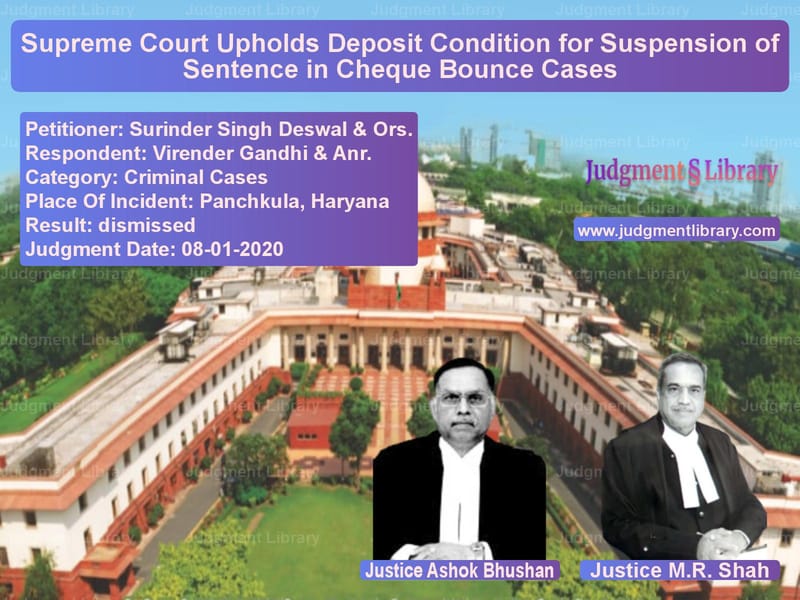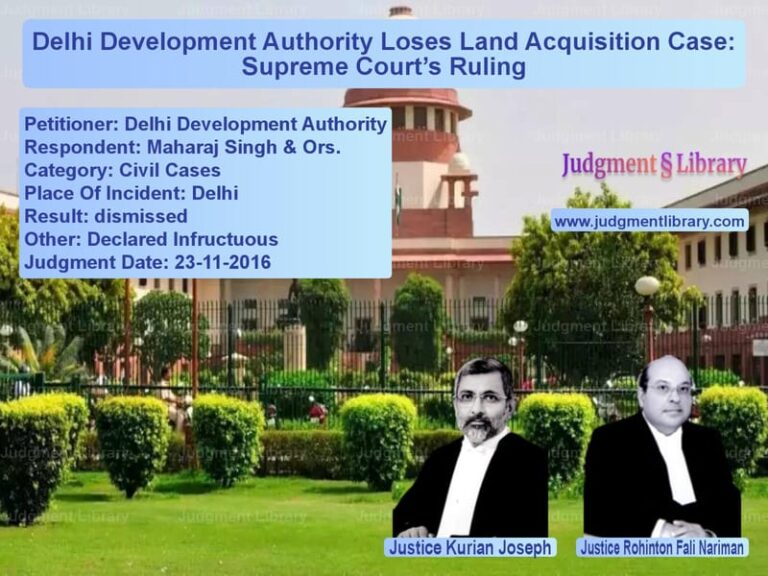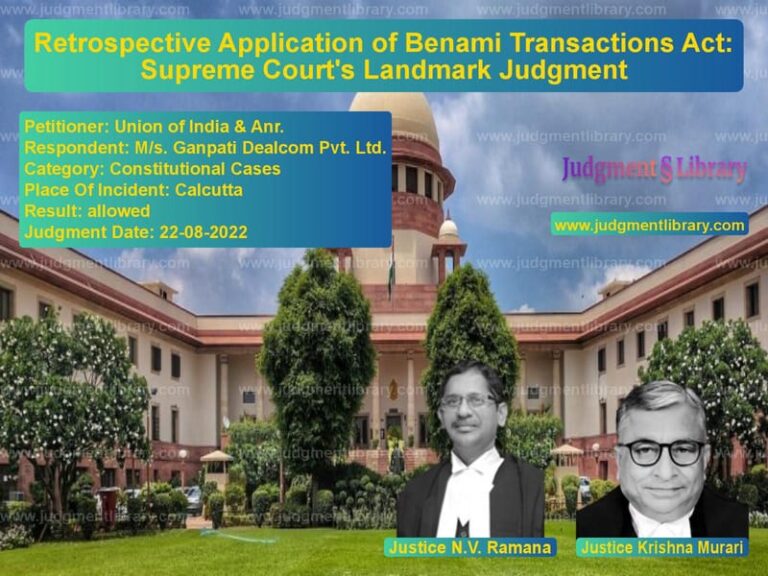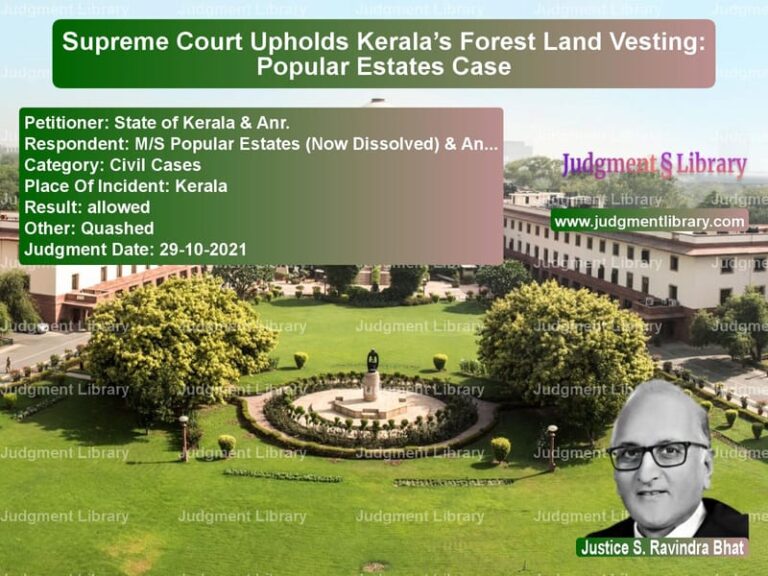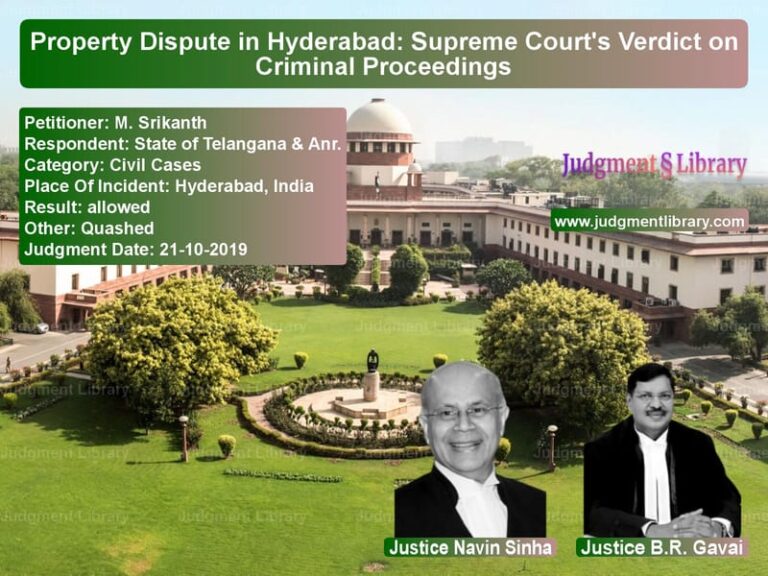Supreme Court Upholds Deposit Condition for Suspension of Sentence in Cheque Bounce Cases
The Supreme Court in Surinder Singh Deswal & Ors. vs. Virender Gandhi & Anr. addressed an important legal issue concerning cheque bounce cases under Section 138 of the Negotiable Instruments Act, 1881 (NI Act). The Court ruled on whether an accused convicted in such cases is required to deposit a portion of the compensation amount while seeking suspension of sentence in appeal.
Background of the Case
The case originated from a financial transaction involving M/s Bhoomi Infrastructure Co. (now known as GLM Infratech Pvt. Ltd.), a partnership firm in which the appellants were partners. The firm issued 64 cheques in favor of the respondent, Virender Gandhi, as part of a retirement settlement agreement.
Key events in the case:
- On April 6, 2015, the respondent deposited a cheque of Rs. 45,84,915, which was dishonored due to insufficient funds.
- The respondent sent a statutory demand notice on May 6, 2015.
- Upon non-payment, he filed 28 complaints under Section 138 of the NI Act.
- The Judicial Magistrate, Panchkula, convicted the appellants on October 30, 2018, sentencing them to two years’ imprisonment and imposing a compensation equal to the cheque amount plus 1% interest and litigation expenses.
The appellants challenged the conviction in the Sessions Court, Panchkula, and sought suspension of sentence. The Sessions Judge granted suspension on December 1, 2018, but required the appellants to deposit 25% of the compensation amount within four weeks.
Arguments by the Appellants
The appellants contended:
- The Sessions Court could not impose a deposit condition under Section 148 of the NI Act, as it was introduced on September 1, 2018, after their case was filed in 2015.
- Requiring a deposit of Rs. 9.4 crores across all cases was excessively burdensome.
- The non-deposit of this amount should not lead to cancellation of the suspension of sentence.
- The amount could have been recovered through normal civil execution proceedings instead of making it a condition for suspension.
Arguments by the Respondents
The respondents argued:
- The legislative intent behind Section 148 of the NI Act was to prevent delays caused by appeals in cheque bounce cases.
- The law mandates a deposit of at least 20% of the compensation amount.
- The appellants had already delayed payments and should not be granted further relief.
Supreme Court’s Observations
1. Applicability of Section 148 of the NI Act
The Court ruled that the provision applies even to cases filed before its enactment:
“At the time when the appeals were preferred, Section 148 was already in force. Therefore, the appellate court was justified in applying it.”
2. Purpose of the Deposit Condition
The Court emphasized that requiring a deposit of 25% of the compensation amount aligns with the objectives of the amendment.
“The intent of the amendment was to ensure that unscrupulous drawers of dishonored cheques do not misuse the legal system to delay payments indefinitely.”
3. Suspension of Sentence and Non-Compliance
The Court held that non-compliance with the deposit condition can lead to the vacation of suspension of sentence:
“Since suspension was conditional, failure to deposit the specified amount automatically results in revocation of suspension.”
Final Judgment
The Supreme Court ruled:
- The Punjab and Haryana High Court’s decision upholding the deposit condition was correct.
- The requirement to deposit 25% of the compensation amount for suspension of sentence was valid.
- The appeals by the appellants were dismissed.
Implications of the Judgment
This ruling has significant implications for cheque bounce cases:
- Section 148 of the NI Act applies to appeals filed after its enactment, even if the case was initially filed earlier.
- Convicted individuals must deposit at least 20% of the compensation amount to secure suspension of sentence.
- Failure to comply with the deposit condition leads to automatic vacation of suspension.
- The judgment strengthens deterrence against delaying tactics in cheque bounce cases.
Conclusion
The Supreme Court’s decision reinforces the necessity of financial accountability in cheque transactions. By upholding the deposit condition, the Court ensures that convicted individuals cannot evade payments by merely filing appeals.
Petitioner Name: Surinder Singh Deswal & Ors..Respondent Name: Virender Gandhi & Anr..Judgment By: Justice Ashok Bhushan, Justice M.R. Shah.Place Of Incident: Panchkula, Haryana.Judgment Date: 08-01-2020.
Don’t miss out on the full details! Download the complete judgment in PDF format below and gain valuable insights instantly!
Download Judgment: Surinder Singh Deswa vs Virender Gandhi & An Supreme Court of India Judgment Dated 08-01-2020.pdf
Direct Downlaod Judgment: Direct downlaod this Judgment
See all petitions in Fraud and Forgery
See all petitions in Cheque Dishonour Cases
See all petitions in Bail and Anticipatory Bail
See all petitions in Judgment by Ashok Bhushan
See all petitions in Judgment by Mukeshkumar Rasikbhai Shah
See all petitions in dismissed
See all petitions in supreme court of India judgments January 2020
See all petitions in 2020 judgments
See all posts in Criminal Cases Category
See all allowed petitions in Criminal Cases Category
See all Dismissed petitions in Criminal Cases Category
See all partially allowed petitions in Criminal Cases Category

